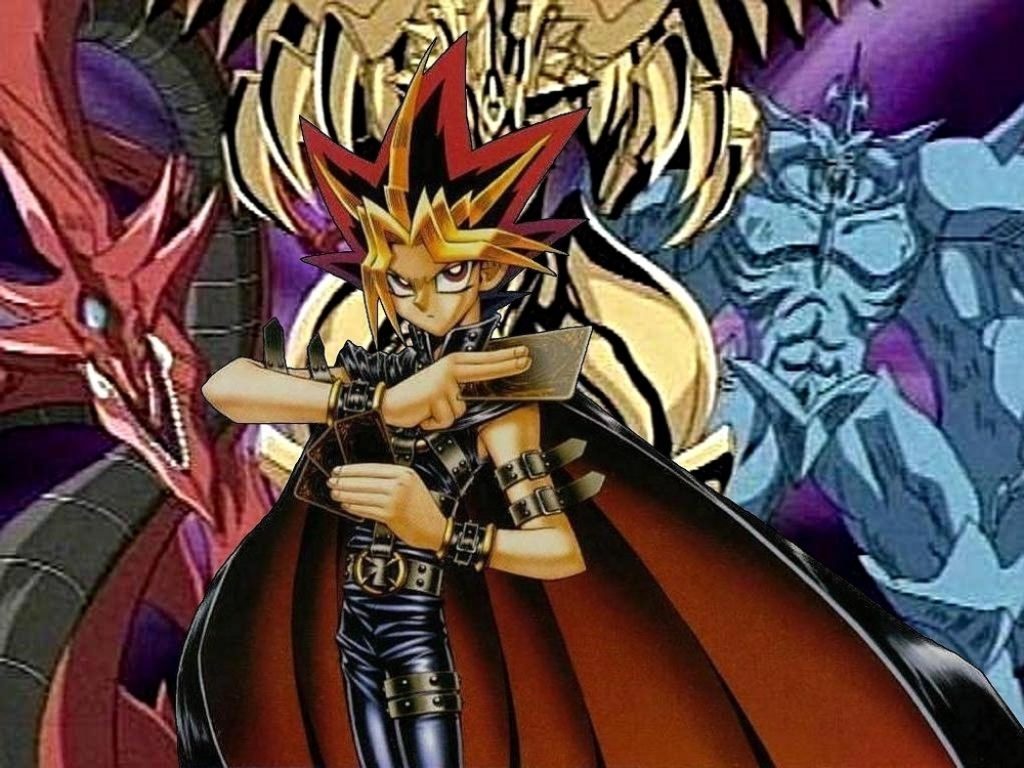
Yugi Moto is no ordinary high school boy. He’s the Master Duelist of a card game that employs magical creatures, spirits and spells to win attack and life points. He owes his undefeated status to the skills handed down to him from Grandpa Moto, his three unique “god cards” and a mysterious puzzle artifact he wears around his neck.
Challenged to a duel by archrival Seto Kaiba, Yugi draws on the energy and skill of his alter-ego, Pharaoh. At the same time, Kaiba is unknowingly being controlled by an ancient evil spirit with an agenda of his own. The resulting game is played out in a parallel universe for the greatest stake of all—the fate of planet Earth.
Yugi (when unencumbered by Pharaoh) is thoughtful and polite, even extending a helping hand to a fallen rival. The ultimate power of friendship and teamwork are said to win the day, but Yugi’s three friends mostly bumble in the background. One scene where their joined hands send up beams of golden light in affirmation of their bond is almost squirm-in-your-seat corny. (Then again, I’m a little older than the intended audience.)
Yu-Gi-Oh! presents a spiritual mishmash of Egyptian mythology, dark spiritism and crass commercialism. Powers are divined from ancient artifacts, unearthed spirits, spells chanted in an eerie foreign tongue and … transforming robots. Yugi derives energy and card-playing prowess from a spirit called Pharaoh that inhabits the medallion he wears around his neck. During duels, Yugi seems “possessed” by the spirit which deepens his voice and “shadows” him during card play. Yugi also owes his Master Duelist status to the three “god cards” he exclusively owns. Visions and prophecies are commonplace. The ancient spirit of Anubis, Egyptian lord of the dead, is unleashed during an archeological dig and is said to be “reborn.” A card monster is also reborn.
Much of this heavy spiritual stuff is covered up in cartoonish, comic-book antics. For instance, when mummies are awakened and give chase to Yugi and friends it looks like a scene straight out of an old TV episode of Scooby Doo. (Other scenes are scarier for younger kids, as when Anubis reaches his full power and takes on the form of a looming, dog-faced, multi-fanged, menacing monster.)
Some of the dueling cards generate images of buxom, scantily clad warrior girls common to the genre, but no suggestive comments are made about their appearance.
Sorcerers, dragons, magicians and monsters leap off playing cards and into battle (resulting in the gain or loss of “life points” and “attack points” for the duelists), made even more “realistic” by Kaiba’s simulation technology. Most defeats are met at the end of a neuron beam of light rather than knife point (although one shadow creature is shown being pierced by a blade) and there’s virtually no blood.
Yugi is surrounded by a schoolyard mob demanding his god cards, but his friends devise an escape at the slight cost of being briefly “pancaked.”
No profanity, just lots of juvenile name calling such as “nobodies,” “chump” and “master of clods.” Duelists provoke each other with sneering voices during card battles.
Ultra-rich game creator Pegasus has a penchant for wine spritzers, but vows never to imbibe before bedtime after suffering a nightmare. One of the dueling cards produces a cartoonish pink-clad nurse who plunges an oversized hypodermic needle into a boy’s bottom. (He gets the point without suffering drug reactions.)
When Yugi senses that dark elements are afoot in the duel with Kaiba, he begs him to end the game. But when his opponent refuses, he keeps playing instead of taking the high road and walking away. Kaiba’s past defeats have left him bitter and blinded by the desire to win at all costs.
Yu-Gi-Oh! (which means “King of Games”) is a major player in grade school and tween culture. The brainchild of manga artist/writer Kazuki Takahashi, it first appeared as a comic book in Japan in 1996. Since then it has spawned the popular card game this movie is based on (over 600,000 people participate in the Yu-Gi-Oh! Duelist League), video games, T-shirts and other wearable sundries, and an animated TV series. Clearly, the point here is to sell product. And the makers of Yu-Gi-Oh! The Movie seem to have only one goal: to serve the greater good of the Yu-Gi-Oh! empire.
As for its dark spiritual side, TV series writer/producer Mike Pecoriello claims that “despite all the magic and supernatural forces involved in the movie, the power of friendship proves to be stronger than anything else, and in the end, that bond will always prevail.” In reality, friendship takes a thematic back seat to big bangs and (sometimes) scary spells.
A postscript: Like the Harry Potter franchise, Yu-Gi-Oh! and other forms of anime are becoming such a pervasive cultural force, concerned parents will want to play the proactive trump card by talking through the issues with their kids. To get started, check out Plugged In‘s articles on the Harry Potter series and the Yu-Gi-Oh! card game.
